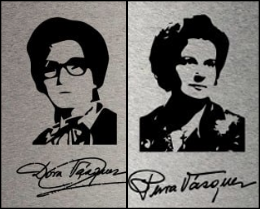The Poetesses of Sil River

ESTA AGRIDOCE VIDA
(PURA VÁZQUEZ)
Readers: Nadira Robeldo, Desi García e Noa Mondelo (4ºESO)
NAS BÁGOAS DO PASADO
(PURA VÁZQUEZ)
Reader: Naiara González (1ºESO)
LÉMBRASTE
(DORA VÁZQUEZ)
Reader: Ana Mateo (3ºESO)
PASATEMPO FERIDO DE VERSOS
(DORA VÁZQUEZ)
Reader: Nadia Touzón (3ºESO)
MULLER GALEGA
(DORA VÁZQUEZ)
Readers: Sara Vaz, Diana Ocambo e Xiana López (1ºESO)
The Poetesses of Sil River
Dora Vázquez Iglesias
- Birth: Ourense, 1913
- Death: Ourense, 2010
- Outstanding works:
-Irmá (1970)
-Pasatempo ferido de versos (1999)
-Campo e mar aberto (1975)
-Madeixas debandando (1997)
-O troleiro e outros contos (2000)
- Profession: Maestra, escritora
- Awards: Premio O Facho
Pura Vázquez Iglesias
- Birth: Ourense, 1918
- Death: Ourense, 2010
- Outstanding works:
-Íntimas (1952)
-Maturidade (1953)
-Desmemoriado río (1997)
-Terra matria de soños (1999)
-Náufragos da elexía (2001)
-Todo vén desa luz (2004)
- Profession: Maestra, escritora
- Awards:
– Medalla Castelao 1995
– Premio Trasalba 1996-Premio de las Letras y las Artes de Galicia 2000
– Miembro de la Real Academia Galega desde 1949
– Artes de Galicia 2000
– Miembro de la Real Academia Galega desde 1949
The family of Pura and Dora Vázquez originating from Ourense arrived to this house in Quiroga from A Coruña, when they were children. It was because of their father’s work as head of the post office. After two years in Quiroga, the family returned to Ourense for work reasons.
Dora, the eldest of the sisters, obtained the title of teacher, and her first destination was Teimende, in Parada do Sil. She remained for 18 years.
As a poet, storyteller, playwright and writer of articles, her work focused especially on the children and young readers, with texts of a didactic and exemplary nature.
Pura interrupted her studies during the Spanish Civil War and stayed in Teimende with her sister. she returned to Ourense in 1944 and finished her teaching degree. She worked in schools in Ourense and Castile, and well as in Venezuela.
She was the first woman to publish in Galician after the Civil War and is also one of the pioneers of children’s and young people’s literature. She mainly wrote poetry, but she also carry out narrative, theatre, essays and journalistic articles. She also participated in numerous collective poetry books.
Both sisters wrote together books as Monicreques (1974), Oriolos neneiros (1975), Viaxe ao país dos contos e da poesía (1985), Teatro completo para nenos (2000).
Since 2002, Pura and Dora Vázquez have given their name to the prize for children’s and young people’s narrative and illustration awarded annually by the province council of Ourense.
En Quiroga, o meu pai tiña nos baixos do edificio a súa oficina de Correos, na que el era o xefe; ademais, tiña que repartir o correo por toda a vila, e distribuílo ás localidades da contorna, que eran aldeíñas daquela, e a meirande parte delas estaban cerca da vila; aínda que tamén o enviaban ós concellos do partido xudicial. Os carteiros das aldeas dos arredores pasaban pola estafeta para recoller alí todo o correo.
O traballo para o papá era pouco e facíao rápido, polo que lle quedaba bastante tempo libre, e como el sabía moito de facer zapatos e botas de encarga, instalou un pequeno negocio paralelo, e colleu un xove axudante para que atendese ese negocio mentres el tiña que traballar fóra.
Tíñamos a vivenda no primeiro andar e a casa estaba na mesma estrada pola que se ía a estación. Desde as ventás e as galerías da casa, viamos o río Sil, que foi, co Miño de Ourense, fundamental na miña vida amante da auga, logo pasaron aquelas crises de medo vividas no Orzán da Coruña. Eses dous ríos, Sil e Miño, mantiveron durante anos a tenra ilusión que conservei sempre polo mar.
(Terra matria dos soños, 1999)
